Following much criticism of the Indonesian government’s initial handling of the COVID-19 pandemic, attention has turned to the prominent role played by Islamic organisations in the world’s most populous Muslim-majority country, particularly following a period of mass internal travel as Ramadan approached. Alexander Arifianto and Jonathan Chen write that, on the whole, religious organisations have set out stricter social distancing guidelines than national and regional policymakers, but that this picture is complicated by the fragmentation of Indonesian Islam in recent decades and the subsequent proliferation of influential religious leaders.
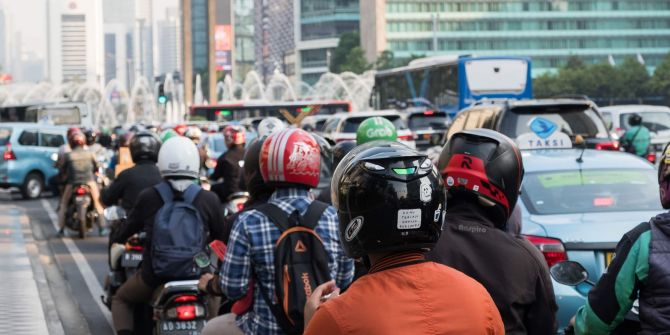
The COVID—19 pandemic has created severe public health and economic crises for many countries worldwide, and Indonesia is no exception.
Observers have written about how Indonesian government officials have mishandled the pandemic during its early stages, potentially contributing to a large number of undetected cases and deaths across the country. Others have written regarding the difficulties facing healthcare professionals caring for thousands of patients infected with COVID—19 in underfunded and under-resourced Indonesian hospitals and the tug-of-war between the national and regional governments over the authority to impose regional lockdowns that have delayed the regions’ response in its control of the spread of the pandemic.
We have researched the response of Indonesia’s religious organizations to the COVID—19 pandemic, particularly focusing on Muslim groups in light of the annual mass movement home (known locally as mudik) that occurs during Ramadan. It is these groups, rather than the central government, that have garnered greater legitimacy and influence among the country’s 270 million citizens as the crisis has deepened. Since religion is enjoying a resurgence in many emerging market nations worldwide, any strategy being pursued to contain and end the pandemic – as well as to reopen these nations – would need to be developed by policymakers with consultation from religious leaders to ensure that the implementations are effective.
According to the constitution drafted when Indonesia proclaimed its independence in 1945, Indonesia is neither a secular nor a theocratic state. However, the influence of religion – especially after the fall of the New Order regime in 1998 – has exerted a disproportionate hold over people’s lives, as indicated by the growing religious piety and conservatism seen across the nation.
Hence, it is not uncommon for religious leaders and even public officials to utilize religious appeal and rhetoric to convey certain perspectives – even if they are flawed, contradictory or simply inaccurate. This was evidently demonstrated when Health Minister Terawan Agus Putranto attributed Indonesia’s low level of COVID—19 cases in mid-February to prayers and supplications to God. Religion was also the reason why, despite appeals from Indonesia’s COVID—19 rapid-response team against attending religious gatherings, thousands of Muslim pilgrims gathered in Gowa, South Sulawesi province for a religious event while hundreds attended an episcopal ordination in Ruteng, Flores.
Hence, it was no surprise that Indonesian President Joko Widodo (known as ‘Jokowi’) turned to religious leaders to be involved in the fight against the spread of COVID—19 by appealing to their congregations to practice social distancing and to discourage participation in large-scale religious gatherings. While many of these leaders have largely complied with the central government’s directive, the situation is not so clear-cut with some leading Islamic groups. This is complicated by two factors.
First, Islam in Indonesia has become more fragmented over the past two decades with the arrival of new transnational Islamic movements ranging from the Muslim Brotherhood (Ikhwanul Muslimin) to Hizb ut-Tahrir Indonesia (HTI) and numerous Salafi movements. The rapid rise in membership and political influence of these groups has raised the concerns of some observers that Indonesia is in the midst of a “conservative turn” and even a “Wahhabi infiltration“.
Second, the growing influence of state-sanctioned Islamic institutions such as the Indonesian Ulema Council (MUI) has also challenged the authority of Nahdlatul Ulama (NU) and Muhammadiyah – the two largest Indonesian Islamic organizations in the country. Even though both these organizations together claim up to 100 million Indonesian Muslims followers, their ability to speak on behalf of the entire Indonesian Muslim community needs to be qualified.
Both Muhammadiyah and NU have discouraged followers from traveling back to their hometowns during the month of Ramadan to prevent the spread of the virus.
Muhammadiyah had advised its followers not to perform the communal morning Idul Fitri (salat eid) prayer usually carried out in a mosque or an open field and to instead pray in their homes. Followers were also advised not to perform Friday prayers at mosques during the pandemic and to postpone the mudik travel.
NU likewise asks its followers to perform their Idul Fitri prayers at home and to perform their rituals according to the health protocols established by the national and regional governments. It also discourages its followers to travel for mudik this year. In addition, numerous NU-affiliated boarding schools (pesantren) have instituted their own lockdown measures by not allowing any instructors or students to leave their premises or visitors to enter.
However, not all Islamic organizations are willing to endorse strong social distancing measures or to discourage Muslims from performing Ramadan travels and religious rituals. On 17 March, the MUI – the quasi-official Islamic institution which had issued several controversial clerical opinions (fatwa) in recent years – issued a new fatwa on the obligation for Muslims to observe their rituals under the circumstances of a pandemic situation, and that Muslims are not obliged to perform Friday prayers in regions that are considered “too risky for human beings.” Nonetheless, they are encouraged to do so in regions that are still considered “safe.”
The fatwa does not specify which areas are deemed “safe” or “risky”, thus allowing for arbitrary interpretations and evidently lacking a serious attempt at enforcement. An MUI spokesperson later said that an MUI fatwa against mudik is unnecessary, as it concerns a person’s livelihood and is not looked upon as a moral issue. The differing positions between Muhammadiyah, NU, and MUI illustrates the growing fragmentation between different Indonesian Islamic groups that have prevented them from speaking with one voice on behalf of all Indonesian Muslim believers during this crisis.
The Jokowi Administration’s position on the annual mass Ramadan movement during the coronavirus pandemic is ambiguous and not in line with the health emergency that he declared on 30 March and the ‘non-natural national disaster’ status he announced on 14 April. The Administration initially refused to issue a formal prohibition against such travel, citing that it had no power to forbid Muslims from doing so. However, as Ramadan approached, an about-face turn of policy was suddenly implemented. Mudik was finally banned by Jokowi on 21 April – two days before Ramadan began. However, it is calculated that more than a million Jakarta residents had already left for the provinces. While many Southeast Asian countries like Singapore have adopted strict lockdown measures to contain the pandemic, Indonesia’s dithering on imposing stricter social distancing measures may be seen as a leadership failure. The pandemic is likely to be the biggest challenge for the Jokowi Administration – a key variable many observers will assess when he steps down from the Indonesian presidency in 2024.
However, many of Indonesia’s major Islamic groups have taken a firm position in favor of stronger social distancing measures compared to the national government. Both NU and Muhammadiyah have begun to distribute assistance to those who have lost their jobs due to the pandemic, including by providing financial assistance for their childrens’ education.
In a region where religious groups and leaders sometimes enjoy greater credibility among the population than state institutions and officials, it is important for political leaders to engage with their religious counterparts as they plan a strategy to contain the pandemic, assist those who are severely affected, and eventually reopen their societies.
Note: This piece gives the views of the author(s), and not the position of the LSE Religion and Global Society blog, nor of the London School of Economics.


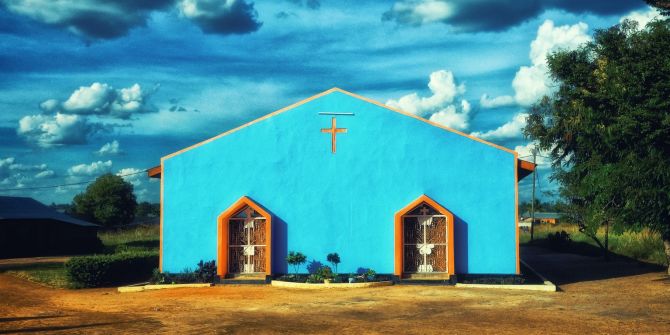
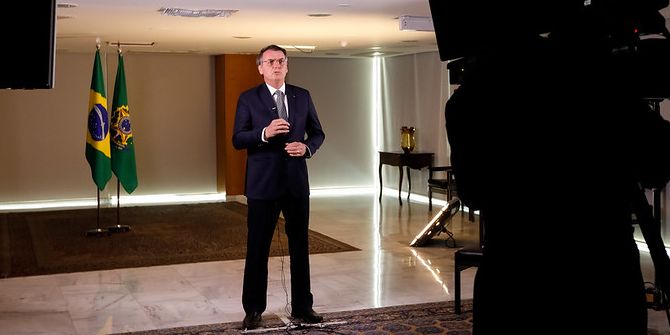
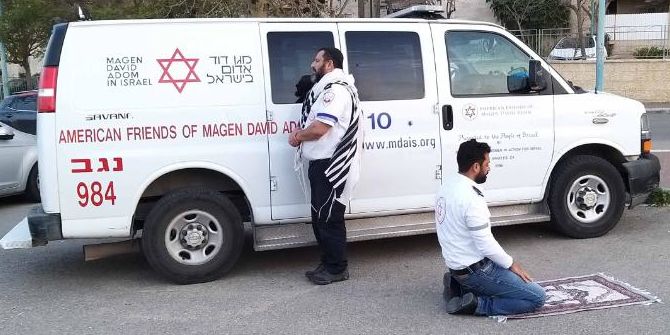
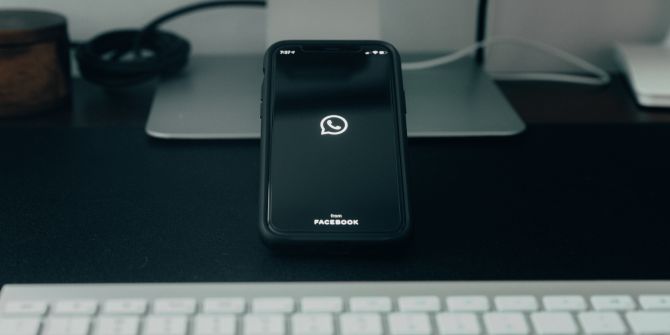
Good article, with useful perspectives. One question : has the role is Islamic groups been increased at last in part because of a push from Vice President Ma’ruf?
Hi Richard, Thanks for your question. Ma’ruf Amin actually requested MUI to issue another fatwa that would’ve prohibited the Lebaran mudik (https://tirto.id/maruf-amin-desak-mui-bikin-fatwa-haram-mudik-ridwan-kamil-setuju-eKFi). However, MUI declined to issue it, likely because it would have contradicted the govt policy which at the time still allowed mudik to occur.
IMO Ma’ruf hasn’t done much in influencing actual policymaking in Jokowi’s 2nd term (Islamic or otherwise) ever since he assumed the VPship last October. His role was primarily to boost Jokowi’s Islamic credentials during last year’s general election and after Jokowi is re-elected, Ma’ruf isn’t given much role in his govt other than symbolic ones like visiting & meeting foreign dignitaries (which was stopped after the pandemic started).
However, MUI still plays a much critical role against the govt policies. It’s vice chairman – possibly the real person in charge of of the organization as Ma’ruf remained in his post as MUI Chair, recently issued a very critical statement against the Jokowi admin and the parliament for quickly passing the Covid19 economic rescue package legislation without much public consultation (https://republika.co.id/berita/qag6px396/mui-dpr-cuma-singa-ompong). This means MUI and other conservative Islamist groups in Indonesia will continue on as critics for the administration in the forseeable future.